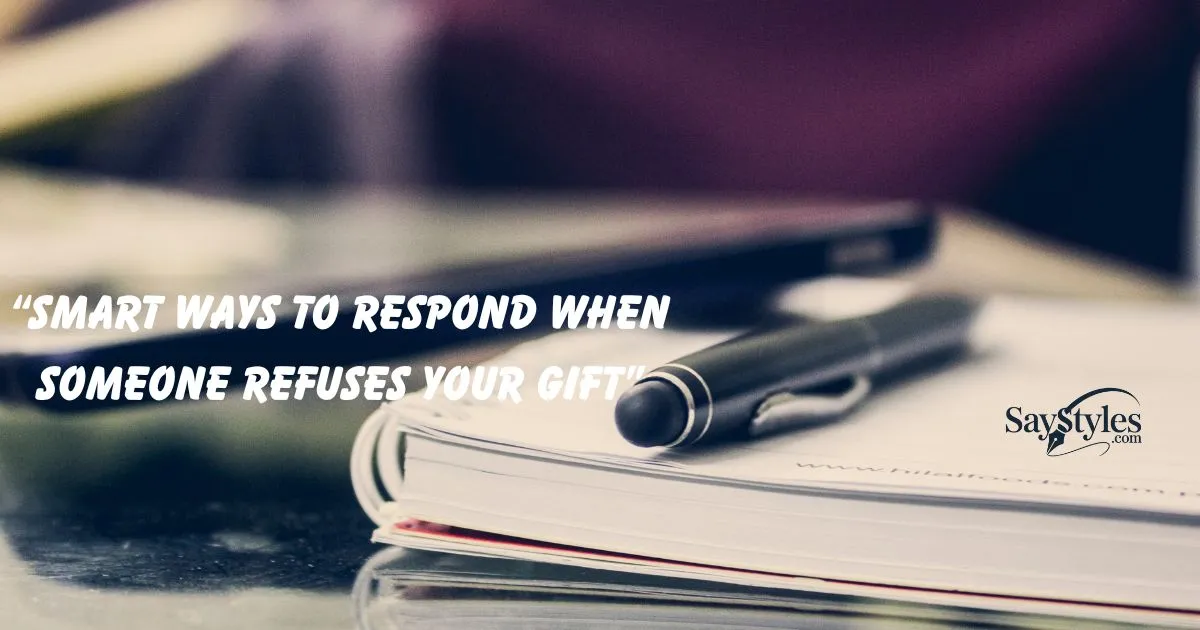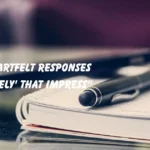“A gift given with love is never wasted, even when it is refused.” When someone politely turns down your present, it can feel a little awkward. But smart ways to respond when someone refuses your gift gracefully can turn that moment into a kind and thoughtful interaction. I’ve faced this many times, and trust me, knowing the right words can make both of you feel comfortable and respected.
Sometimes, people say no because of pride, timing, or just personal choice. Reacting with patience and warmth shows that you care more about their feelings than just the act of giving. In this article, I will share smart ways to respond when someone refuses your gift gracefully, so you can handle these moments with ease, confidence, and a smile.
Here, you will find simple tips, real-life examples, and easy phrases you can use immediately. By the end of this article, responding to gift refusals will feel natural and kind, helping you maintain good relationships every time.
What It Means When Someone Refuses Your Gift
When someone refuses your gift, it can signal shyness, modesty, or surprise, rather than dislike. In texts, chats, or real-life interactions, it often reflects humble manners, personal boundaries, or playful teasing. Understanding the context helps you respond appropriately while maintaining friendship or rapport.
List of Respond When Someone Refuses Your Gift
- No Worries, I Understand
- Your Happiness Matters More
- That’s Totally Okay
- I Appreciate Your Honesty
- Just Knowing You Thought of It Is Enough
- Thanks for Letting Me Know
- I Respect Your Choice
- No Pressure, Really
- I’m Happy You Feel Comfortable
- It’s the Thought That Counts
- I’m Grateful You Considered It
- That’s Completely Fine
- Your Words Mean a Lot
- I Respect Your Decision
- All Good, No Hard Feelings
- I Appreciate Your Politeness
- Just Seeing You Happy Is Enough
- No Problem at All
- I Understand, Thanks for Telling Me
- Your Comfort Comes First
- I Value Your Honesty
- That’s Totally Understandable
- Thanks for Being Transparent
- I Respect How You Feel
- No Need to Accept, Really
- Your Thoughts Are Enough
- I Appreciate Your Grace
- That’s Fine, No Worries
- I’m Glad You Told Me
- Your Comfort Matters Most
- I Respect Your Choice Fully
- Thanks for Being Honest
- It Means a Lot You Considered It
- I Appreciate Your Kindness
- No Pressure, I Promise
1. No Worries, I Understand
Story: Chloe reassured her friend after they declined an offer.
When to Use: Use when someone apologizes or declines politely.
When Not to Use: Avoid if the situation needs further discussion.
Example:
Ben: “I can’t join your trip this weekend.”
Chloe: “No worries, I understand.”
How to Respond 🗣️
Acknowledge their understanding and feel reassured.
2. Your Happiness Matters More
Story: Emma emphasized her friend’s well-being over her own plans.
When to Use: Use when someone prioritizes their own comfort or feelings.
When Not to Use: Avoid if the decision has serious consequences.
Example:
Alex: “I’d rather stay home tonight.”
Emma: “Your happiness matters more.”
How to Respond 🗣️
Feel appreciated and valued.
3. That’s Totally Okay
Story: Mia responded casually to a polite refusal.
When to Use: Use for light situations where someone declines politely.
When Not to Use: Avoid if the situation is serious or formal.
Example:
Noah: “I can’t attend the meeting today.”
Mia: “That’s totally okay.”
How to Respond 🗣️
Acknowledge and accept their response.
4. I Appreciate Your Honesty
Story: Chloe thanked her friend for being upfront about a decision.
When to Use: Use when someone is transparent with you.
When Not to Use: Avoid if honesty comes with rudeness.
Example:
Ben: “I don’t think I can help with this task.”
Chloe: “I appreciate your honesty.”
How to Respond 🗣️
Feel respected and valued for being truthful.
5. Just Knowing You Thought of It Is Enough
Story: Emma expressed gratitude even when a gesture couldn’t happen.
When to Use: Use when someone shows care but cannot follow through.
When Not to Use: Avoid if a response is required.
Example:
Alex: “I wanted to send a gift but couldn’t.”
Emma: “Just knowing you thought of it is enough.”
How to Respond 🗣️
Feel appreciated for the thought, not the action.
6. Thanks for Letting Me Know
Story: Mia acknowledged a friend’s polite update.
When to Use: Use when someone informs you about a change.
When Not to Use: Avoid if the information is irrelevant.
Example:
Noah: “I won’t be able to join lunch today.”
Mia: “Thanks for letting me know.”
How to Respond 🗣️
Acknowledge and appreciate the update.
7. I Respect Your Choice
Story: Chloe honored her friend’s decision respectfully.
When to Use: Use when someone makes a personal choice.
When Not to Use: Avoid if their choice affects others negatively.
Example:
Ben: “I’m not comfortable sharing that today.”
Chloe: “I respect your choice.”
How to Respond 🗣️
Acknowledge the decision and support them.
8. No Pressure, Really
Story: Emma reassured a friend that they don’t have to commit.
When to Use: Use when someone feels unsure or hesitant.
When Not to Use: Avoid if the situation requires a firm decision.
Example:
Alex: “I’m not sure if I can come.”
Emma: “No pressure, really.”
How to Respond 🗣️
Feel relaxed and unpressured.
9. I’m Happy You Feel Comfortable
Story: Mia showed she values her friend’s ease over anything else.
When to Use: Use when someone chooses their comfort over obligation.
When Not to Use: Avoid if their choice harms others.
Example:
Noah: “I’d rather stay home tonight.”
Mia: “I’m happy you feel comfortable.”
How to Respond 🗣️
Feel validated for prioritizing comfort.
See also: “Smart & Heartfelt Responses to ‘Drive Safely’ That Impress”
10. It’s the Thought That Counts
Story: Chloe appreciated a gesture even if it didn’t happen perfectly.
When to Use: Use when someone makes an effort that didn’t fully succeed.
When Not to Use: Avoid if results are critical.
Example:
Ben: “I tried baking cookies but they burned.”
Chloe: “It’s the thought that counts.”
How to Respond 🗣️
Feel appreciated for the effort.
11. I’m Grateful You Considered It
Story: Emma thanked a friend for thinking of her even if they couldn’t follow through.
When to Use: Use when someone shows thoughtfulness or intention.
When Not to Use: Avoid if their consideration had negative consequences.
Example:
Alex: “I wanted to help but got busy.”
Emma: “I’m grateful you considered it.”
How to Respond 🗣️
Feel appreciated for their thoughtfulness.
12. That’s Completely Fine
Story: Chloe reassured her friend after a polite decline.
When to Use: Use when someone refuses gently or apologizes.
When Not to Use: Avoid if the situation requires formal acknowledgment.
Example:
Ben: “I can’t make it to dinner tonight.”
Chloe: “That’s completely fine.”
How to Respond 🗣️
Accept the response warmly.
13. Your Words Mean a Lot
Story: Mia appreciated a friend’s honesty or kindness.
When to Use: Use when someone’s message is meaningful.
When Not to Use: Avoid if their words were casual or unimportant.
Example:
Noah: “I wanted to check if you’re okay.”
Mia: “Your words mean a lot.”
How to Respond 🗣️
Feel valued and acknowledged.
14. I Respect Your Decision
Story: Emma honored her friend’s choice without pressure.
When to Use: Use when someone makes a personal or thoughtful choice.
When Not to Use: Avoid if their decision negatively affects others critically.
Example:
Alex: “I won’t participate in the project.”
Emma: “I respect your decision.”
How to Respond 🗣️
Support their choice sincerely.
15. All Good, No Hard Feelings
Story: Chloe reassured a friend after a decline or mistake.
When to Use: Use to ease tension or misunderstanding.
When Not to Use: Avoid if the issue requires serious discussion.
Example:
Ben: “Sorry I forgot to reply.”
Chloe: “All good, no hard feelings.”
How to Respond 🗣️
Feel reassured and tension-free.
16. I Appreciate Your Politeness
Story: Mia acknowledged a courteous refusal or honesty.
When to Use: Use when someone communicates respectfully.
When Not to Use: Avoid if the tone wasn’t polite.
Example:
Noah: “I won’t be able to attend.”
Mia: “I appreciate your politeness.”
How to Respond 🗣️
Feel valued and respected.
17. Just Seeing You Happy Is Enough
Story: Emma expressed contentment at her friend’s comfort, regardless of circumstances.
When to Use: Use when prioritizing someone else’s happiness.
When Not to Use: Avoid if their happiness causes harm.
Example:
Alex: “I decided to skip the event for my comfort.”
Emma: “Just seeing you happy is enough.”
How to Respond 🗣️
Feel supported and appreciated.
18. No Problem at All
Story: Chloe reassured a friend after a polite decline.
When to Use: Use when someone apologizes or declines.
When Not to Use: Avoid if a serious issue requires more discussion.
Example:
Ben: “I can’t help this time.”
Chloe: “No problem at all.”
How to Respond 🗣️
Acknowledge and accept calmly.
19. I Understand, Thanks for Telling Me
Story: Mia expressed gratitude for honest communication.
When to Use: Use when someone shares their limitations or feelings openly.
When Not to Use: Avoid if they were vague or unclear.
Example:
Noah: “I can’t attend the meeting today.”
Mia: “I understand, thanks for telling me.”
How to Respond 🗣️
Feel respected and informed.
20. Your Comfort Comes First
Story: Emma reassured a friend that their ease is more important than obligations.
When to Use: Use when someone prioritizes themselves over others.
When Not to Use: Avoid if their choice negatively affects others.
Example:
Alex: “I’ll stay home tonight.”
Emma: “Your comfort comes first.”
How to Respond 🗣️
Acknowledge and support their decision.
21. I Value Your Honesty
Story: Chloe thanked her friend for being upfront.
When to Use: Use when someone communicates truthfully.
When Not to Use: Avoid if their honesty was hurtful.
Example:
Ben: “I can’t join your plan.”
Chloe: “I value your honesty.”
How to Respond 🗣️
Feel respected for transparency.
See also: “Best Ways to Say ‘Reach Me at This Number’ Professionally”
22. That’s Totally Understandable
Story: Mia reassured a friend that their decision or feeling is reasonable.
When to Use: Use when someone makes a choice based on their comfort or limits.
When Not to Use: Avoid if the decision is harmful.
Example:
Noah: “I need to skip the meeting.”
Mia: “That’s totally understandable.”
How to Respond 🗣️
Acknowledge their reasoning sincerely.
23. Thanks for Being Transparent
Story: Emma appreciated a friend’s clarity about their limitations.
When to Use: Use when someone communicates clearly and openly.
When Not to Use: Avoid if the transparency was unnecessary or rude.
Example:
Alex: “I can’t commit to this task.”
Emma: “Thanks for being transparent.”
How to Respond 🗣️
Feel respected and informed.
24. I Respect How You Feel
Story: Chloe acknowledged a friend’s emotions and choices respectfully.
When to Use: Use when someone shares their feelings or decisions.
When Not to Use: Avoid if the feelings are irrelevant to the discussion.
Example:
Ben: “I’m not comfortable joining.”
Chloe: “I respect how you feel.”
How to Respond 🗣️
Support their emotional perspective.
25. No Need to Accept, Really
Story: Mia reassured a friend they don’t have to agree or participate.
When to Use: Use when someone feels pressured to accept something.
When Not to Use: Avoid if acceptance is required.
Example:
Noah: “I can’t take the gift.”
Mia: “No need to accept, really.”
How to Respond 🗣️
Feel relaxed and unpressured.
26. Your Thoughts Are Enough
Story: Emma appreciated the consideration even if the action wasn’t possible.
When to Use: Use when effort or intent matters more than execution.
When Not to Use: Avoid if results are critical.
Example:
Alex: “I wanted to help but couldn’t.”
Emma: “Your thoughts are enough.”
How to Respond 🗣️
Feel valued for your consideration.
27. I Appreciate Your Grace
Story: Chloe thanked a friend for polite understanding after a decline or limitation.
When to Use: Use when someone handles situations respectfully.
When Not to Use: Avoid if the situation wasn’t handled graciously.
Example:
Ben: “I can’t attend.”
Chloe: “I appreciate your grace.”
How to Respond 🗣️
Feel respected and valued.
28. That’s Fine, No Worries
Story: Mia reassured a friend casually after a refusal or apology.
When to Use: Use for light, casual declines.
When Not to Use: Avoid in formal or serious contexts.
Example:
Noah: “I forgot to respond earlier.”
Mia: “That’s fine, no worries.”
How to Respond 🗣️
Acknowledge calmly and accept.
29. I’m Glad You Told Me
Story: Emma expressed gratitude for honesty or transparency.
When to Use: Use when someone shares important info or feelings.
When Not to Use: Avoid if the information wasn’t helpful.
Example:
Alex: “I can’t come to the party.”
Emma: “I’m glad you told me.”
How to Respond 🗣️
Feel appreciated for sharing openly.
30. Your Comfort Matters Most
Story: Chloe prioritized her friend’s comfort above all else.
When to Use: Use when someone chooses their own ease over obligation.
When Not to Use: Avoid if their choice could cause harm.
Example:
Ben: “I’d rather stay home.”
Chloe: “Your comfort matters most.”
How to Respond 🗣️
Support their choice sincerely.
31. I Respect Your Choice Fully
Story: Mia acknowledged a friend’s decision with full respect.
When to Use: Use when someone makes a clear decision.
When Not to Use: Avoid if the choice negatively impacts others significantly.
Example:
Noah: “I can’t join the plan.”
Mia: “I respect your choice fully.”
How to Respond 🗣️
Support and honor their decision.
32. Thanks for Being Honest
Story: Emma thanked a friend for candid communication.
When to Use: Use when someone shares their true feelings or limitations.
When Not to Use: Avoid if honesty was unnecessarily harsh.
Example:
Alex: “I can’t help this time.”
Emma: “Thanks for being honest.”
How to Respond 🗣️
Feel respected and acknowledged.
33. It Means a Lot You Considered It
Story: Chloe appreciated the thought even if it couldn’t be realized.
When to Use: Use when someone thinks of you or tries to help.
When Not to Use: Avoid if their consideration wasn’t genuine.
Example:
Ben: “I wanted to join but was busy.”
Chloe: “It means a lot you considered it.”
How to Respond 🗣️
Feel valued for the effort.
See also: ”Best Witty & Sweet Replies for XOXO to Melt Hearts”
34. I Appreciate Your Kindness
Story: Mia thanked a friend for thoughtful communication or gesture.
When to Use: Use when someone shows care or courtesy.
When Not to Use: Avoid if the gesture or words were insincere.
Example:
Noah: “I checked in to see if you were okay.”
Mia: “I appreciate your kindness.”
How to Respond 🗣️
Feel grateful and respected.
35. No Pressure, I Promise
Story: Emma reassured a friend that they don’t need to feel obligated to respond or accept anything.
When to Use: Use when someone might feel stressed or hesitant about a request.
When Not to Use: Avoid if the situation requires a firm commitment or action.
Example:
Alex: “I’m not sure I can attend the event.”
Emma: “No pressure, I promise.”
How to Respond 🗣️
Feel relaxed and unpressured while knowing your choice is respected.
How These Clever Responses Actually Work
Clever replies to someone refusing your gift work by using humor, reassurance, or charm. A witty or gentle response can ease awkwardness, show thoughtfulness, and turn the moment into a lighthearted, memorable interaction. These responses make your gesture feel appreciated even if initially declined.
Top 15 Editor’s Choice Responses
- “No worries, I just wanted to share something special with you.”
- “That’s completely fine, I understand.”
- “I appreciate your honesty, thank you.”
- “I respect your choice; the thought still comes from the heart.”
- “It’s okay, the gesture was what mattered most.”
- “I’m glad I could try to brighten your day, even a little.”
- “No problem, just seeing your smile means a lot to me.”
- “Thank you for letting me know, I respect that.”
- “It’s alright, giving is my way of showing I care.”
- “Don’t worry about it, I enjoyed picking it out for you.”
- “I completely understand, your comfort comes first.”
- “That’s fine; it’s the thought that counts anyway.”
- “I’m just happy I could think of you today.”
- “No hard feelings, your happiness is what matters.”
- “I respect your decision, and I hope we still share great moments.”
Conclusion
When someone refuses your gift, responding gracefully shows maturity, empathy, and respect. A simple, thoughtful reply lets the other person feel comfortable while maintaining your kindness.
Remember, it’s not always about the gift itself but the love, thought, and intention behind it that truly matters. Handling such moments with poise strengthens relationships and leaves a positive impression, even without an exchange of presents.

I’m Lily Hart, the Admin behind the engaging responses at SayStyles.com! With a knack for blending wit and warmth, I turn every piece of writing into something memorable. From clever advice to fun comebacks, I’m here to make sure every response leaves you smiling and thinking.






